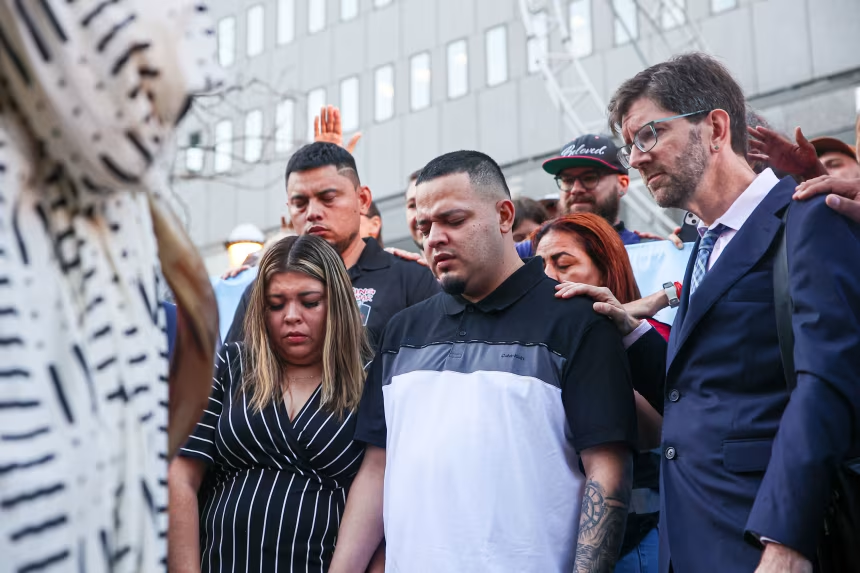From Administrative Error to Eswatini: The Unfolding Saga of Kilmar Abrego Garcia’s Deportation

Administrative Error to Eswatini: Explore the controversial deportation of Kilmar Abrego Garcia—from wrongful removal to El Salvador, legal battles, and now plans to send him to Eswatini. A deep dive into the deportation policy, human rights concerns, and the fight for due process.
1. A Dramatic Turn: Deportation Plan Shifted to Eswatini
What was already a contentious deportation saga has taken an unexpected turn: the Trump administration has now informed Kilmar Abrego Garcia that the U.S. intends to deport him to Eswatini, a small absolute monarchy in southern Africa ReutersThe Daily BeastCBS NewsNew York Post.
This represents at least the fourth country considered in his removal—Uganda was paused by court ruling, Costa Rica was floated as part of a plea offer, and El Salvador was previously ruled off-limits by a judge due to feared persecution ReutersNew York Post+1Diario ASCBS NewsWikipedia.
In a blunt ICE email, officials dismissed his claim of fearing persecution in multiple nations—over 22 across Latin America and Africa—as “hard to take seriously.” Despite this, they stated the new removal country is Eswatini ReutersCBS NewsNew York PostThe Daily Beast.
2. Who Is Kilmar Abrego Garcia? A Legal and Human Rights Flashpoint
A Family Man Mistakenly Deported
Kilmar Abrego Garcia, a 30-year-old Salvadoran living in Maryland with his U.S. citizen family, was first removed to El Salvador in March despite a 2019 immigration judge’s order blocking such deportation due to risk of gang-related persecution WikipediaReutersNew York Post. The U.S. government later called the deportation an “administrative error” WikipediaCBS News.
Legal and Political Backlash
His case attracted national attention. A federal judge, U.S. District Judge Paula Xinis (Obama appointee), halted deportation to Uganda and scheduled an evidentiary hearing for October 6 New York Post. Advocacy groups—state governors, unions, grassroots movements, CASA—have rallied behind him, framing the case as emblematic of due process erosion Wikipedia.
Allegations vs. Denials
Authorities accused him of MS-13 affiliation, human smuggling, domestic abuse, even child predation; Abrego Garcia and his lawyers have flatly denied all claims The Daily BeastCBS NewsNew York PostReuters. His legal team has also accused the government of using deportation threats as coercion for plea deals, including offering Costa Rica if he accepted guilt ReutersDiario ASNew York Post.
3. Eswatini: Why This Choice Sparks Alarm
A Country with Little Ties to the Individual
Eswatini—formerly Swaziland—is an absolute monarchy in southern Africa with no known connection to Abrego Garcia. It is one of several African nations that have received U.S. deportees under third-country removal deals ReutersNew York PostAP News.
Human Rights and Legal Concerns
Reports reveal that earlier deportees to Eswatini have been held without charge or legal access in harsh prison conditions, such as the Matsapha Correctional Complex AP News. Abrego Garcia’s lawyers warn that Eswatini offered no assurances he wouldn’t be sent back to El Salvador, where he was tortured ABC NewsNew York PostThe Daily Beast.
Opaque, Troubling Agreements
“These third-country deportations lack transparency,” critics say—many governments seem to agree with the U.S. outside judicial or public review. Uganda’s deal was similarly criticized for bypassing oversight and possibly being motivated by political gain AP News.
4. Legal Tightrope: Asylum, Due Process, and Political Pressure
Asylum Reopened?
Abrego Garcia’s attorneys have moved to reopen his case to allow him to seek asylum within one year of his re-entry into the U.S.—a right they argue was reset when he was wrongfully deported and later returned WikipediaCBS NewsReuters.
Government Pushback
The government has opposed reopening, arguing he’s ineligible for asylum due to alleged ties with MS-13 and criminal charges CBS NewsReutersThe Daily Beast. They also suggest reopening could reopen removal protections to El Salvador, which they claim would allow deportation CBS NewsReuters.
Plea Bargain Pressure
Attorneys say ICE offered Costa Rica as a removal option if he pled guilty—characterizing it as coercive and unconstitutional in exerting political pressure ReutersDiario ASNew York Post.
Judicial Safeguards
Judge Xinis’s ruling paused deportation and allowed time for Abrego Garcia to present his case, underscoring the judiciary’s role amid politically charged immigration shifts New York Post.
5. Why This Matters: Human Rights, Rule of Law, and Immigration Policy
A Precedent for Eroding Due Process
If the U.S. can deport someone to a country they’ve never been to—without transparency or guarantee of safety—it sets a disturbing precedent.
Potential for Abuse
Using deportation as leverage for plea deals threatens to undercut criminal justice integrity and constitutional protections.
Global Reputation
Following deportees into secret detention in Eswatini raises serious questions about U.S. compliance with human rights norms AP News.
Immigrant Communities’ Trust
Cases like this bolster fears among immigrants and citizens alike that legal protections—and even common decency—can be subverted by politicized decisions.
6. Next Steps and What to Watch
- October 6 Hearing: Watch for key developments at the evidentiary hearing Judge Xinis called New York Post.
- Legal Filings: Will the government defend its asylum ineligibility claim? Will Garcia’s team succeed in reopening his case?
- Public Response: Advocacy groups, state officials, unions, & immigrant rights organizations are likely to remain vocal.
- Policy Awareness: This case illuminates broader debates over third-country deportations, executive overreach, and what legal protections still persist in U.S. immigration enforcement.
Conclusion: A Struggle for Justice in the Shadow of Power
Kilmar Abrego Garcia’s journey—from mistaken deportation to allegations of coercion, from abandoned due process to threatened removal to a distant, opaque nation—is a powerful, cautionary tale.
It reveals the levers of power that can be pulled at the expense of rights, the fragility of legal order under political pressure, and the human faces behind dry policy debates.
As this story unfolds, it forces us to ask: Is the rule of law still the bedrock of justice, or is it bending under the weight of executive might? And what does this mean for all of us who cherish fairness and accountability?
Stay tuned, stay informed—and above all, stay grounded in the human story that intersects with law, politics, and the global march towards justice.







